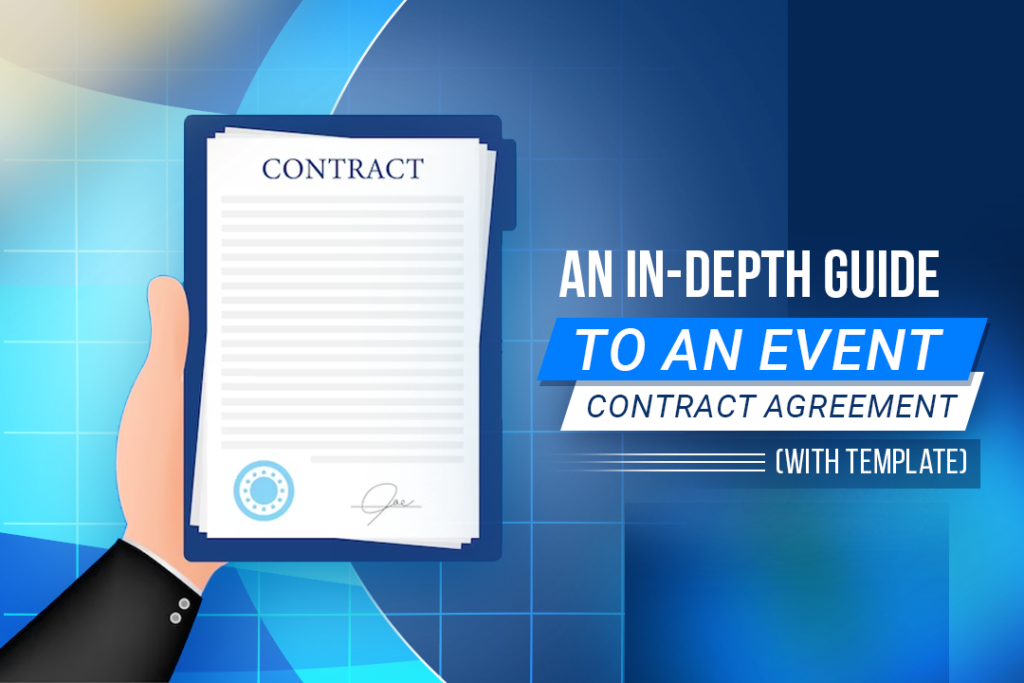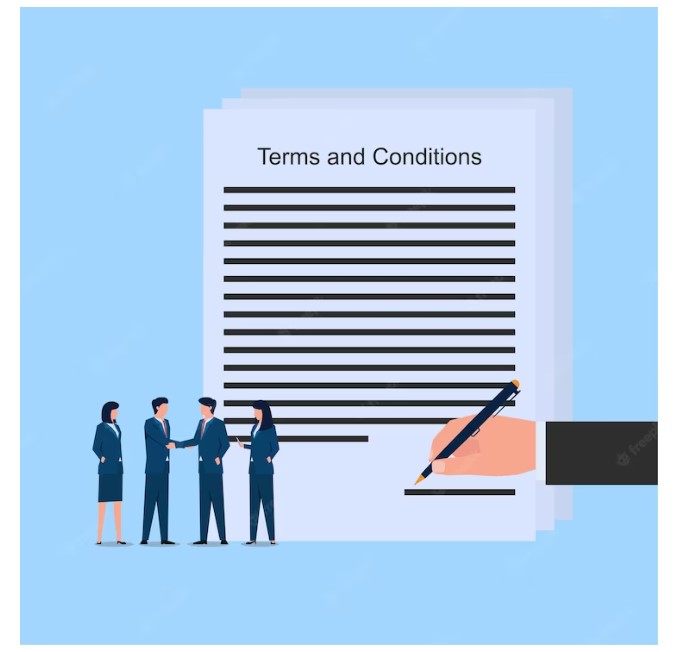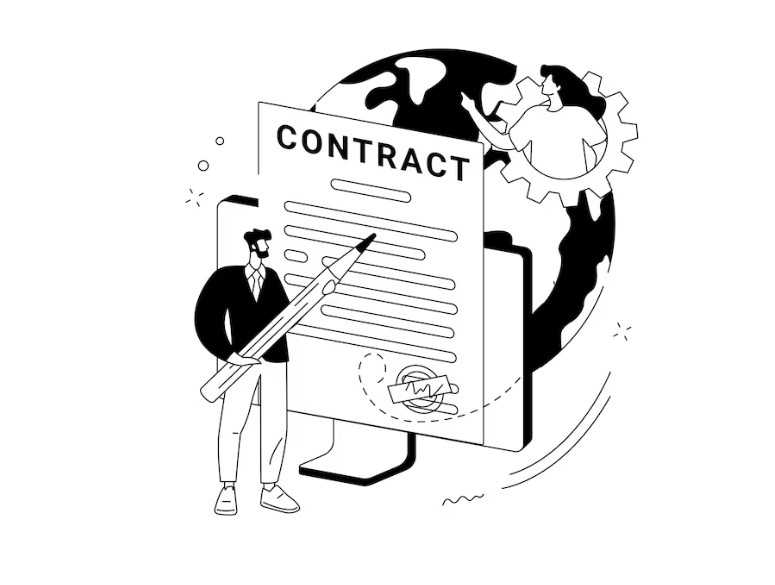
A verbal agreement is unreliable when you take on a new client or clients for your event planning. You need a well-drafted event contract agreement to outline the terms and conditions of each other’s services. If, in any case, disputes arise, then an event contract agreement may help you seek justice.
Multiple tasks revolve around an event, and it is obvious to overlook some of the activities. In such cases, a contract lets you plan and execute the event structurally.
What is an Event Contract Agreement?
An event contract is a legally binding document that frames the terms and conditions of a deal between an event organizer or client and a vendor or service provider. It is also commonly known as an event services agreement or vendor contract. The contract establishes both parties’ rights, obligations, and expectations regarding the provision of goods or services for an event.

A well-drafted legal contract agreement ensures clarity and mutual understanding between the involved parties. It clearly outlines the expectations, responsibilities, and deliverables for all parties involved, leaving no room for ambiguity or misunderstandings. It lays the foundation for a well-structured and successful event-planning process, benefiting all parties involved.
15 Essential Elements for Designing Event Contract Agreement:
While designing an event contract agreement, consider including the following 15 essential elements:
1. Mention Involved Parties
Do mention all the involved parties in your event contract agreement. It refers to the individual or organization responsible for planning, organizing, and executing the event.

Identifying and including the relevant parties in the event contract agreement is essential to establish each party’s legal relationships, rights, and obligations in the event planning and execution process. These parties can be Event Organizer or Company, Client, Vendor, Service Providers, or participants.
2. Provide Event Details
In an event contract agreement, the event details section should include comprehensive information about the event. Incorporating all event details in the contract helps ensure the event organizer and client understand the planned event.

State the name of the event. Specify the exact start and end date and time of the event. Provide the venue name, address, and other relevant details about the specific area in your agreement.
Mention a concise but informative event description, highlighting its purpose, theme, or unique features. It helps to give a clear understanding of the nature of the event. In the description, state the event’s goals, objectives, or desired outcomes, highlighting its purpose for the client or organization hosting the event.
Define the intended audience or target demographic for the event. Specify the maximum number of attendees or participants allowed for the event. It helps ensure that the possibility remains within the expected capacity limits.
Outline any specific requirements or arrangements necessary for the event, such as technical equipment, staging, seating arrangements, signage, or any special requests made by the client.
If the event has a specific theme or branding elements, describe them in detail. It could include color schemes, logos, taglines, or other visual and branding guidelines. State the expected deliverables of the event, such as presentations, reports, promotional materials, or any different outputs agreed upon by the parties.
If any additional services are associated with the event, such as catering, transportation, accommodation, or other support services, mention them here or refer to separate agreements if applicable.
3. Specify the Event Planning Company’s Services
A clear and detailed description is essential while specifying the event planning company’s services. It’s important to thoroughly explain the event planning company’s services in the contract agreement to ensure both parties conceive the scope of work and the specific services to be delivered.

The following are some crucial factors to consider:
- Event Conceptualization and Design: Describe the event planning company’s role in conceptualizing and designing the overall event, including themes, aesthetics, and creative elements.
- Venue Selection and Management: Specify the event planning company’s responsibilities for venue selection, negotiation, and management, such as site visits, contract negotiation, floor plans, and logistics coordination.
- Logistics and Production: Outline the logistics and production services provided by the event planning company, including coordination of event setup, audio-visual requirements, staging, lighting, sound, and technical support.
- Vendor Management: Specify the event planning company’s role in sourcing, selecting, and managing vendors, such as caterers, decorators, audio-visual technicians, entertainers, and other suppliers required for the event.
- Budget Management: Describe the event planning company’s budget management responsibilities, including cost estimation, financial tracking, and expense reconciliation.
- Marketing and Promotion: Specify the event planning company’s involvement in marketing and promotion activities, such as developing marketing strategies, creating promotional materials, managing social media campaigns, and coordinating media relations. Read A Comprehensive Guide of Event Marketing Strategies That Guarantee Success for more insights.
- Registration and Attendee Management: Outline the event planning company’s responsibilities in managing attendee registration, ticketing, RSVP tracking, and on-site registration services.
- Program Development and Speaker Management: Describe the event planning company’s involvement in program development, including speaker selection, coordination, and management.
- On-site Event Management: Specify the event planning company’s role in on-site event management, including overseeing event operations, managing staff and volunteers, and handling unforeseen issues or emergencies.
- Post-Event Evaluation: Outline the event planning company’s responsibilities for conducting post-event evaluations, gathering feedback, and providing a comprehensive event analysis.
4. Include Payment Terms
Include payment details in an event contract agreement. It is essential to outline the financial aspects of the arrangement. It helps establish a clear understanding of the financial obligations, payment expectations, and consequences for non-compliance. It promotes transparency and reduces the likelihood of misunderstandings or disputes related to payment matters.
Firstly, the total fees the client must pay for the planner’s comprehensive services must be articulated. Establish a transparent payment schedule, specifying payment due dates or intervals, whether as a lump sum or divided into installments.
Determine if a deposit or retainer is necessary, clearly outlining the upfront amount or percentage—state conditions for deposit refundability or non-refundability. Specify the accepted payment methods, providing flexibility through bank transfers, credit cards, checks, or other acceptable forms.
Define penalties for late payments, including a percentage or flat fee and consequences for non-payment. Make it explicit that the client is responsible for any event costs incurred since the last settlement. Address additional fees or expenses related to the event planning process, covering reimbursable expenses or costs tied to specific services or materials.
Specify the currency for payments and clarify whether listed legal fees or charges include applicable taxes. Outline the invoicing process, including format, frequency, and essential details to be included in each invoice.
To address payment disputes, establish clear procedures, whether through mediation, arbitration, or legal action. Define conditions under which the contract may be terminated and provide a detailed refund policy in case event planning services are not fully delivered or if the event is canceled. This comprehensive approach ensures a fair and well-defined financial understanding between both parties.
5. Distribute Areas of Responsibilities
It’s wise to clearly define each party’s responsibilities in the event contract agreement to ensure a smooth and successful event planning and execution process. Such a distribution of responsibilities helps establish accountability, clarifies expectations, and provides all parties with an understanding of their specific roles and obligations. Resourceful and successful event partnerships are truly helped by this.
Multiple jobs are to be performed directly and indirectly for your special events. So, it is essential to discuss and mention this in your event contract agreement.
The event organizer is responsible for providing event goals, objectives, and desired outcomes. They need to communicate event requirements, themes, and target audiences. They have to approve event concepts, designs, and proposals. They must provide required information, materials, and resources, coordinate internal stakeholders and obtain necessary approvals, ensure compliance with relevant laws, regulations, and permits, and promote the event to target audiences.
Vendors or Service Providers are responsible for delivering the agreed-upon goods or services per the contract, meeting quality standards and specifications. They must adhere to agreed-upon timelines and schedules and provide necessary equipment, personnel, and resources.
In the event venue contract, the event planning agreement is defined further. Venue-related jobs include providing the event space and facilities as agreed upon. Ensuring the venue is appropriately set up and ready for the event. Managing venue-specific logistics, such as seating arrangements and security. Providing necessary technical equipment and support. Coordinating food and beverage services if applicable. And ensure compliance with safety regulations and emergency procedures.
You can also read more about how to build event partnerships in 21 Tips for Building Successful Event Partnerships.
6. Specify Event Budget
Specifying the estimated budget in the event contract agreement helps ensure transparency, accountability, and effective event management. It establishes a clear understanding between the event planning company and the client regarding the financial aspects of the event and facilitates efficient financial management throughout the event planning process.
You must provide a budget breakdown by significant expense categories: venue, production, decor, catering, marketing, staffing, entertainment, and other essential expenditure areas. This will help you understand how the budget will be allocated across different aspects of the event.
You must specify the budget’s approval process, including any required client approvals or sign-offs. Outline whether the budget can be adjusted or modified and under what circumstances.
Define the responsibilities of the event planning company in managing the budget. It may include tracking expenses, seeking cost efficiencies, providing regular budget updates to the client, and obtaining approval for significant budget deviations. Explain how the payments and reimbursements process will occur. It may include details about the payment schedule, invoicing process, acceptable payment methods, and any reimbursement policies or procedures for client-funded expenses.
Address the process for handling changes or adjustments to the budget during the planning and execution phases. Specify the circumstances under which budget adjustments may occur, the process for requesting changes, and any required approvals. Describe the reporting mechanisms for the financial aspects of the event. It may include providing regular financial reports to the client, detailing the expenses incurred against the budgeted amounts, and explaining any variances.
7. Explain Contract Termination
Contract termination is a provision in an event contract agreement that outlines the circumstances, conditions, and consequences under which the event contract agreement can be legally ended before its originally scheduled completion. It defines the rights and gauntlets of both parties in the event of contract termination.
Firstly, specify the conditions or situations that allow either party to terminate the contract. It may include non-performance, breach of contract, non-payment, insolvency, force majeure events, or mutual agreement. Define the notice period required for contract termination. The notice period allows both parties to prepare for the termination and minimize potential negative impacts.
Outline the steps or procedures to be followed for contract termination. It may include delivering a written notice of termination, indicating the effective termination date, and specifying any required documentation or actions to be taken. Clarify the outcomes of contract termination for both parties. It may include obligations for the event planning company to provide a final report, return unused funds, or hand over relevant event materials to the client. Similarly, it may require the client to pay any outstanding balances or fulfill payment obligations for completed services.
Include provisions for resolving any disputes arising from contract termination. This may involve mediation, arbitration, or other agreed-upon methods. Specify any costs, penalties, or damages associated with contract termination. These could include cancellation fees, reimbursement of expenses incurred, or compensation for non-performance.
Address the treatment of intellectual property and confidential information during contract termination. Define the ownership rights, return of materials, and confidentiality obligations that continue even after termination.
8. Include Force Majeure Clause
A force majeure clause is vital in any event contract agreement as it protects both parties from unforeseen circumstances or events that could prevent them from fulfilling their obligations.
Consider incorporating a force majeure clause into your event contract agreement for unforeseen circumstances. If either party cannot fulfill its contractual obligations due to a force majeure event, such as acts of nature, war, terrorism, civil unrest, or government actions, the affected party will be excused from performance for the duration of the hindrance. The clause defines a force majeure event as any circumstance beyond the affected party’s reasonable control.
Should the force majeure event persist for an extended grace period, either party can terminate the contract by giving written notice. In such cases, neither party will be liable for damages arising from the termination. Despite the force majeure event, the affected party remains responsible for previously fulfilled or achievable obligations despite the circumstances.
It’s crucial to note that the force majeure clause does not excuse or delay payment obligations unless directly prevented by the force majeure event. Both parties commit to acting in good faith and collaborating for a fair resolution in the event of a force majeure occurrence. Tailor the clause to your event’s specifics and seek legal advice to ensure its appropriateness and enforceability in your jurisdiction.
9. Elaborate Insurance Policy
An insurance policy in an event contract agreement is a provision that addresses the insurance coverage required for the event to protect both parties involved. The specific insurance requirements and coverage limits should be tailored to the nature and scale of the event and any legal and contractual obligations in the relevant jurisdiction. The purpose of this clause is to ensure that adequate insurance is in place to mitigate risks and liabilities associated with the event.
Here’s an elaboration of the Insurance Policy clause:
- General Insurance Coverage: The Event Organizer agrees to maintain comprehensive general liability insurance throughout the event. The insurance coverage shall protect against claims for bodily injury, property damage, personal injury, and advertising injury arising from or in connection with the event.
- Insurance Coverage Limits: The specific coverage limits shall be detailed in a separate insurance certificate provided to the other party at least [number of days/weeks/months] before the event’s commencement.
- Additional Insured: The [Host/Venue/Organizer] shall be named an additional insured on the Event Organizer’s insurance policy.
- Proof of Insurance: The Event Organizer shall provide the [Host/Venue/Organizer] with a certificate of insurance, demonstrating the existence of the required insurance coverage and the inclusion of the [Host/Venue/Organizer] as an additional insured. The certificate shall be submitted to the [Host/Venue/Organizer] by the specified deadline.
- Cancellation Insurance: In the event of unpredictable circumstances that result in the cancellation, postponement, or abandonment of the event, the event organizer is encouraged to obtain event cancellation insurance. The coverage should protect against financial losses incurred due to such circumstances, subject to the terms and conditions of the insurance policy.
- Worker’s Compensation Insurance: If applicable, the Event Organizer should maintain worker’s compensation insurance as required by law, covering all employees and contractors involved in the event.
- Certificate Renewal: The Event Organizer agrees to provide updated insurance certificates as needed throughout the event contract agreement term and any extensions or renewals.
- Compliance with Laws: The insurance policy should apply to all applicable rules, regulations, and jurisdiction requirements where the event occurs.
- Seek Legal Advice: Parties should seek the advice of an insurance professional or legal expert to ensure that the insurance policy adequately protects their interests and complies with local laws and regulations. Additionally, the insurance clause may vary depending on whether the event organizer is an individual, company, or non-profit.
10. Incorporate Intellectual Property
Incorporating Intellectual Property (IP) provisions in an event contract agreement is essential to define and protect the rights and ownership of any intellectual property created, used, or shared during the event. Intellectual property can include trademarks, copyrights, patents, trade secrets, and other proprietary information.

Here’s how you can consist of IP provisions in the event contract agreement:
- Ownership of Intellectual Property: All pre-existing intellectual property rights should remain the exclusive property of the respective parties and shall not be transferred or affected by this event contract agreement. Any new intellectual property created or developed during the event shall be owned by the creator(s) of such intellectual property, subject to the provisions outlined in this event contract agreement.
- License Grant: Each party grants the other party a non-exclusive, royalty-free, worldwide license to utilize any pre-existing intellectual property that may be necessary for the successful execution of the event. Any new intellectual property created during the event shall be licensed to the other party on a non-exclusive basis, subject to the terms of this event contract agreement.
- Use of Event Materials: Both parties agree that any materials, presentations, documents, or other work product created for or during the event shall be used solely for the event and related promotional activities. Neither party shall use or disclose any event materials for commercial purposes without obtaining prior written consent from the owning party.
- Protection of Intellectual Property: Each party agrees to take reasonable measures to protect the other party’s intellectual property rights from unauthorized use, copying, or distribution. In the case of any unauthorized use or infringement of intellectual property, the infringing party shall be responsible for any damages or losses incurred by the other party.
- Publicity and Promotional Materials: Both parties may use each other’s names, logos, and trademarks for promotional purposes related to the event, subject to the prior written approval of the concerned party. Any promotional materials using the other party’s intellectual property shall be reviewed and approved by the respective party before use. If you want to promote an event that guarantees success, read A Comprehensive Guide to Event Promotion That Guarantees Success.
- Return or Destruction of Materials: Upon termination of this event contract agreement or the request of the owning party, the other party shall promptly return or, if agreed upon, destroy all confidential and proprietary information, materials, and documentation provided by the owning party.
11. Include a Confidentiality Clause
A confidentiality clause in an event contract agreement is crucial to protect sensitive information shared between the parties during the event’s planning and execution. This clause ensures that both parties maintain the confidentiality of proprietary and confidential information and refrain from disclosing it to third parties.
“Confidential information” shall mean any non-public information, data, materials, documents, trade secrets, know-how, financial information, or proprietary information disclosed by one party to the other party during the event. The Receiving Party shall not disclose, reproduce, or use the Confidential Information for any purpose other than the proper execution of the event and as required by this event contract agreement.
It is essential to explicitly define the scope of what constitutes Confidential Information and tailor the clause to the specific needs and circumstances of the event.
12. Explain Amendments and Modifications
The amendments and modifications in an event contract agreement refer to the extent to which the parties can make changes or alterations to the original contract after it has been executed. These changes are often necessary to accommodate evolving circumstances and new requirements or to address unforeseen issues while planning and executing the event. Properly defining the scope of amendments and modifications helps ensure that any changes made are done in a controlled and agreed-upon manner.

When considering the scope of permissible changes in your event contract, it’s essential to cover various aspects. Modifications may include adjustments to event dates, times, locations, services, deliverables, quantities, or any relevant provisions. Specify in the methodology that changes must be documented in writing and signed by both parties to be considered valid, ensuring a clear record and avoiding misunderstandings.
Ensure that amendments or modifications occur within a reasonable timeframe, providing both parties sufficient time for review and agreement. The scope may also limit the number or significance of improvements, such as allowing only minor changes after a specific date or restricting changes that exceed a certain percentage of the total contract value.
Address how changes to the contract will impact the overall price and other terms. It may involve provisions for adjusting the contract price, payment schedule, or deadlines to accommodate modifications. Additionally, the scope should outline a dispute resolution process to address and resolve any disagreements related to proposed changes. This comprehensive approach ensures clarity, transparency, and effective management of changes throughout the event contract.
13. Encompass Cancellation Policy
The cancellation policy in an event contract agreement is a crucial provision that outlines the terms and conditions related to either party’s cancellation or termination of the event contract. This policy helps protect both parties’ interests in case unforeseen circumstances arise, making it necessary to cancel the event.
The terms of the cancellation clauses, including the cancellation fee (if applicable), notice periods, and refund conditions, should be carefully negotiated and agreed upon by both parties before finalizing the contract.
14. Append Dispute Resolution
Dispute resolution is a process for resolving disagreements or disputes between the parties. A well-defined dispute resolution clause helps promote effective communication and timely resolution of issues and can prevent potential legal battles.

In the event management company, if any dispute or disagreement arises with the contract, the parties should first attempt to resolve the matter amicably through good-faith negotiations. The mediation shall be conducted by a neutral attorney mutually agreed upon by the parties or, if they cannot agree, appointed by a recognized mediation service.
If the dispute remains unresolved after mediation, either party may initiate binding arbitration to resolve the matter. Despite the above, either party may seek injunctive relief or pursue legal action to enforce any rights or protect confidential or proprietary important information without resorting to mediation or arbitration.
Each party shall bear costs and expenses incurred during the dispute resolution process, including attorney’s fees unless otherwise awarded by the arbitrator. During the dispute resolution process, the parties should continue to perform their respective obligations under this event contract agreement, except to the extent that the dispute directly impacts the performance of specific duties.
Any legal action or proceedings related to the event contract agreement shall be brought exclusively in the courts of [State/Country], and the parties with this consent to the jurisdiction of such courts. The above dispute resolution clause is just an example and may need to be customized to suit the specific needs and circumstances of the event contract and the jurisdictions involved.
15. Outline Signatures Space
When drafting an event contract agreement, including appropriate signature spaces is essential to ensure all parties can sign the contract with clarity and mutual acknowledgment. The signature spaces should be clearly labeled, allowing each party to sign their name.
Ensure that each party signs their name in the designated signature space. Consider adding a section for witnesses if required by local laws or for added legal validity. Make sure the signature spaces are large enough to comfortably accommodate signatures. If the event contract agreement involves more than two parties, include additional signature spaces and identify each party. Before signing, all parties should carefully review the binding contract and seek legal advice if needed.
Key Takeaways:
This article will help you construct your event contract agreement efficiently. The agreement should identify all the involved parties and elaborately provide event details. It should also provide available services, payment terms, cancellation and refund policies, force majeure clauses, termination, etc.
You have to ensure that both parties thoroughly review and understand the contract before signing it.
Parties must consult with legal professionals to ensure that the event contract agreement provisions comply with applicable laws and regulations. Clear and comprehensive contract clauses protect the interests of both or multiple parties and provide a framework for an orderly and fair conclusion to the contractual relationship. A few clauses may vary depending on whether the event organizer is an individual, company, or non-profit.
If you are in the event space and find this article useful, then you can visit Eventible for other event-related articles and information. Eventible is a review platform where attendees can leave their feedback after attending an event. The reviews act as social proof to event organizers and marketers, who can use the feedback to improve their events the following year, thereby doing their best to improve attendee experience and satisfaction.













Comments are closed.